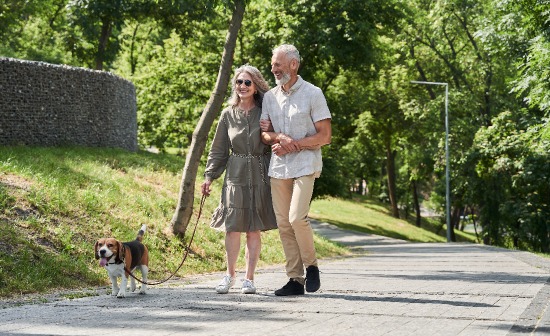“It might seem like the same old advice, but it’s often just about bringing it back to basics and looking after our physical wellbeing, because we know physical health and mental health is so interconnected.”—Millie Catania, MindStep Mental Health Coach, Remedy Healthcare.
Key points
- The COVID pandemic bought with it mental health issues, reports Beyond Blue’s Dr Grant Blashki.
- Australian Unity Wellbeing Index research found that mental distress increased during the pandemic, with mental distress levels about 10 points higher (i.e. worse) than in 2013.
- Some of the strategies you can employ to support your mental health include rebuilding your connections, monitoring your social media activity and learning to “control the controllables”.
Asked to gauge the impact of the pandemic on Australia’s mental health, Dr Grant Blashki doesn’t pull any punches. As lead adviser at Beyond Blue, a practising GP and an academic at University of Melbourne, Grant has confronted the COVID-19 fallout from multiple angles.
“The research finds, as does my clinical experience, that the pandemic had a traumatic effect on people’s mental health,” he says. “Everyone’s had their own individual drama going on.”
From relationship troubles, financial stress and loss of purpose, to increased drug and alcohol use, Grant cites a number of factors that COVID has provoked. And that’s before you start on the spike in clinical conditions such as anxiety and depression.
“It was triple whammy on people’s lives,” says Grant. “It affected their home life, there was a lot of strain on relationships. It affected their work life. And there was for many people a sense of loneliness and disconnection. But I also think it really undermined people’s sense of certainty and security.”

Grant’s perspective is reinforced by Australian Unity Wellbeing Index research. The Wellbeing Index, which has been tracking the wellbeing of Australians in partnership with Deakin University for more than 20 years, found that all three measures of mental distress—anxiety, stress, and depression—were about 10 points higher (i.e. worse) during the pandemic compared to 2013 data.
“We know that that mental illness really peaked during the pandemic, particularly in young people,” says Dr Kate Lycett from Deakin University’s School of Psychology and lead researcher of the Australian Unity Wellbeing Index. “So, for instance mental health service use surged, while calls to services like Lifeline went through the roof.”
In short, the pandemic added extra strain to the mental health of the nation. But given that the virus still maintains a persistent grip on Australian life, what can we learn from our collective experience to protect ourselves in the months ahead?
Rebuild your connections
The pandemic enforced a climate of physical isolation. Whether it was due to lockdowns, travel restrictions or the swing towards remote work, face-to-face catch-ups with family, friends and colleagues suddenly became harder and more complicated.
“The research certainly identifies loneliness as an important precipitant of mental health issues, which is not surprising as we are very social beings,” says Grant. “There’s certainly a lot of loneliness in the community and a sense of disconnection, and that’s not great for people’s mental health”
We might try to paper over these social cracks with Zoom drinks or social media banter. But these superficial electronic connections tend to be pale substitutes for the physical interactions we’re hardwired to crave, says Grant. “That’s why when I’m helping a lot of people with mental health issues, one of the first things I do is say: ‘Let’s reconnect you with whoever we can—family, friends, the community—or consider volunteering’.”

It’s advice in line with Australian Unity Wellbeing Index data that found people who have high-quality relationships tend to have greater wellbeing. The pandemic forced us to realise how important these really are to our mental health.
“It’s about booking regular catch-ups with friends and family, not leaving it to chance,” says Grant. “Because sitting in your own thoughts when you’re having a hard time, is probably the worst thing you can do.”
Living with uncertainty
“During the pandemic, people lost control over many aspects of their lives,” says Millie Catania, a coach for the mental health program MindStep®, which is delivered by Australian Unity’s health partners Remedy Healthcare. “Whether you were trying to organise a wedding, a child’s birthday party or elective surgery, COVID seemed to delight in sabotaging your carefully laid plans. And then doing it all over again.”
We all became wearily familiar with thwarted arrangements. In these tricky circumstances, our best bet is to try and “control the controllables,” suggests Millie.
“It’s easy for us to fall into unhelpful ways of thinking, ruminating about what’s happened in the past, but also getting caught up in these future uncertainties and all those ‘what-ifs’,” she says. “There’s always going to be a ‘what-if’. So, if they can, people should try and focus on what they can control in the present moment.”

But how do we actually refocus on the here and now? Learning to practise mindfulness, meditation or controlled breathing are all genuinely helpful options, suggests Millie. Another tip is to actively strive to cultivate a gratitude mindset by acknowledging the things you can be appreciative of, rather than brooding on all those you’ve missed out on. Admittedly, it’s advice that might sound a little fluffy to some, but Millie insists “these strategies can help you to let go of those worries and refocus your mind on the present”.
The importance of self-care
Mental health used to be a topic shrouded in stigma and secrecy. Luckily, that’s no longer the case, with Australia making huge strides in recent years to openly acknowledge and tackle the many issues that it encompasses. But the mental strain that many people experienced during COVID has made the public even more aware of the issue.
“The pandemic has accelerated a trend towards mental health literacy,” says Grant. “There is now a more explicit understanding that you’ve got to protect your mental health.”
That growing recognition brought with it the understanding that we need to look after ourselves or face the consequences. “It might seem like the same old advice, but it’s often just about bringing it back to basics and looking after our physical wellbeing,” says Millie. “Because we know physical health and mental health is so interconnected.”

What that translates to is familiar advice: maintaining a balanced diet, getting regular exercise, avoiding too much booze and practising good sleep hygiene. Grant also recommends curating your social media. “Recognise that those algorithms are incredibly addictive, and can zap your attention and take you into a really unhealthy space. Have a strategy to curate your engagement.”
Following the fundamentals will give you a better chance to safeguard your mental health. But Millie stresses that it’s okay if you might need extra help—in which case, the sooner you can get it, the better.
“If people are finding that their mental health has declined or it’s continuing to deteriorate, don’t be afraid to tell someone else how you’re feeling or seek further support,” she says. “And with all of this, be kind to yourself and be patient with yourself. What a few years it’s been!”
Disclaimer: Information provided in this article is not medical advice and you should consult with your healthcare practitioner. Australian Unity accepts no responsibility for the accuracy of any of the opinions, advice, representations or information contained in this publication. Readers should rely on their own advice and enquiries in making decisions affecting their own health, wellbeing or interest. Interviewee titles and employer are cited as at the time of interview and may have changed since publication.


